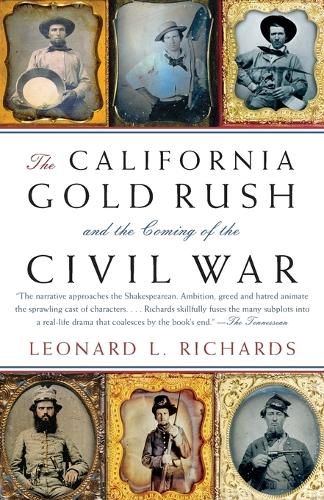
The California Gold Rush and the Coming of the Civil War
(Paperback)
Publishing Details
The California Gold Rush and the Coming of the Civil War
By (Author) Leonard L. Richards
Random House USA Inc
Vintage Books
15th May 2008
United States
Classifications
Physical Properties
Paperback
304
Width 133mm, Height 201mm, Spine 18mm
272g
Description
Award-winning historian Leonard L. Richards gives us an authoritative and revealing portrait of an overlooked harbinger of the terrible battle that was to come.
When gold was discovered at Sutter's Mill in 1848, Americans of all stripes saw the potential for both wealth and power. Among the more calculating were Southern slave owners. By making California a slave state, they could increase the value of their slavesby 50 percent at least, and maybe much more. They could also gain additional influence in Congress and expand Southern economic clout, abetted by a new transcontinental railroad that would run through the South. Yet, despite their machinations, California entered the union as a free state. Disillusioned Southerners would agitate for even more slave territory, leading to the Kansas-Nebraska Act and, ultimately, to the Civil War itself.
Reviews
Richards, a leading historian of 19th century America superbly illuminates gold rush California as a land in contention between national pro and antislavery lobbies in the decade leading up to the Civil War.
Publishers Weekly (starred review)
Richards offers a broad panorama that moves seamlessly from the gold fields to the halls of congress. This is an excellent work of popular history that will add to the appreciation of a critical epoch in our national development.
Booklist
Brings to life a population of scheming officeholders, xenophobic Californians and frantic slaveholders, all of whom resorted to the ultimate frontier solution: violence.
Kirkus Reviews
An engrossing chronicle of the political intrigues that engulfed California in the 1850s, when pro-Southern legislators there angled to turn the states newfound wealth to the benefit of the slave economy.
The Atlantic
The important back-story of the Gold Rush, according to gifted historian Leonard Richards, is political and racial. Mr. Richards contends in this insightful new book, The California Gold Rush and the Coming of the Civil War that for every fortune seeker who viewed California as a place to get rich discovering gold, another believed it a place to get rich exporting, utilizing, or trafficking in human slaves. . . . [A] gripping book.
The New York Sun
Richards meticulously catalogs details of 19th-century American legislation that nonspecilaists wont have thought about since high school: the Missouri Compromise, the Gadsden Purchase, the Kansas-Nebraska Act. But when he places the actors center stage to reveal the motives behind the politics, the narrative approaches the Shakespearean.
Tennessean
With a mastery that brings even his bit players to life, Leonard Richards tells a gripping story about politics, business, violence, and the scoundrels who almost destroyed the United States. If you think you already know this story, you're in for some nice surprises. And if you dont, theres no better guide.
Robin L. Einhorn, author of American Taxation, American Slavery
Leonard Richards has once again produced a wonderful, entertaining, and informative account of antebellum politics. Most important, he shows the myriad forcesgreed, ambition, idealism, racism, patronage, migration, expansionismthat melded together to distance southerners from northerners. Any one reading this work will come away with a deep understanding of how the antagonism between free and slave labor systems constituted the volatile fuel that made the explosion of secession and civil war possible.
James L. Huston, author of Calculating the Value of the Union: Slavery, Property Rights, and the Economic Origins of the Civil War
A truly rollicking book, full of colorful characters, duels, hard-rock miners, Chivs, and back-stabbing politics. But its readability belies the centrality of these seemingly minor characters to the drama of the nations sectional crisis. The Golden State can no longer be ignored by those wishing to tell the story of how the nation came to civil war.
Jonathan H. Earle, author of Jacksonian Antislavery and the Politics of Free Soil, 1824-1854
Author Bio
Leonard L. Richards, Professor of History at the University of Massachusetts, grew up in California, and earned his AB, MA, and Ph.D. at the University of California, Berkeley and Davis. He has also taught at San Francisco State College and the University of Hawaii. His "Gentlemen of Property and Standing": Anti-Abolition Mobs in Jacksonian America won the American Historical Association's Albert J. Beveridge Award in 1970. The Life and Times of Congressman John Quincy Adams was a Finalist for the Pulitzer Prize in 1987 and The Slave Power: The Free North and Southern Domination, 1780-1860 took the second-place Lincoln Prize in 2001. He is also the author, with William Graebner, of The American Record (1981, 1987, 1995, 2000, 2005) and of Shay's Rebellion: The American Revolution's Final Battle (2002). He and his wife live in Amherst, Massachusetts.
